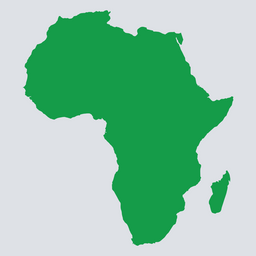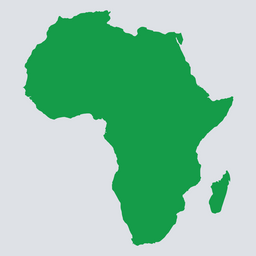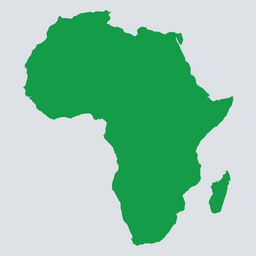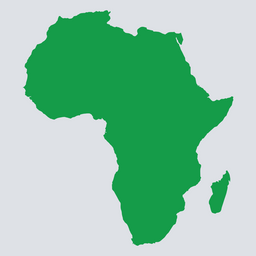Sona's Field Notes #04: Strong Founder or Wrong Founder?
After three Field Notes on external challenges, Sona Mahendra turns inward: exploring founder archetypes, market timing, and the uncomfortable truth about what constitutes winning.

I've been on quite a journey this year, transitioning from backing founders at 54 Collective to building my own startup. The transformation has been humbling: seeing how lessons learnt while supporting other people's ventures now play out in my own.
After my initial hijack of Andile Masuku's TechTides Africa column, African Tech's Next Big Challenge: Matching Venture Capital to Realistic Outcomes, I've been reflecting publicly on how I'm navigating the founder's chair with fresh perspective from the other side.

My four-part Field Notes capsule series has offered me an outlet to share this evolution, both psychological and practical.
The first instalment tackled that haunting question keeping African founders awake: "But is it VC-backable, tho?"
I pushed back. Why pre-filter ideas through investor lenses when most founders are too early for VC conversations anyway? Freedom from market-size obsession, I argued, actually speeds up learning.

March brought The Market Size Misconception, where I challenged founders who abandon promising ideas over perceived total addressable market limitations.
Drawing from Y Combinator wisdom, I called out the "VC toolkit" mentality that kills viable businesses before they prove themselves. In Africa's problem-rich environment, I figure that any substantial challenge pursued long enough will grow into real opportunity.

April's Principles Over Playbooks cited Cedric Chin's demolition of the "Idea Maze" concept and Peter Thiel's first principles thinking, questioning Africa's dependence on imported playbooks.
I reckon that successful companies emerge from deeply personal journeys that resist cookie-cutter approaches.

Across these pieces, I've wrestled with structure versus intuition, received wisdom against lived reality.
Now, in this final reflection in the series, I'm turning the microscope on myself rather sharply, confronting a question that pervades my quiet moments.
"Am I the right founder to build this business?"
"Am I the right founder to build this business?" is a recurring question I ask myself.
I don't ask this just because the constant curveballs result in inevitable imposter syndrome, but because evaluating any venture requires honestly assessing whether the founder, even if it's you, has what it takes to win in that market.
There's a lot of content about "founder archetypes" and "strong founders" across LinkedIn thought pieces. Most of it boils down to lukewarm labels like "execution-focused" or "visionary," which don't actually explain why some people succeed and others don't. By those definitions, nearly anyone passionate enough is a "good" builder until they're not.
What does it even mean to be a "strong founder" when markets are this brutal? That question led me down a rabbit hole, with ChatGPT as my thinking partner, to explore common types and how they perform across different markets and business models.
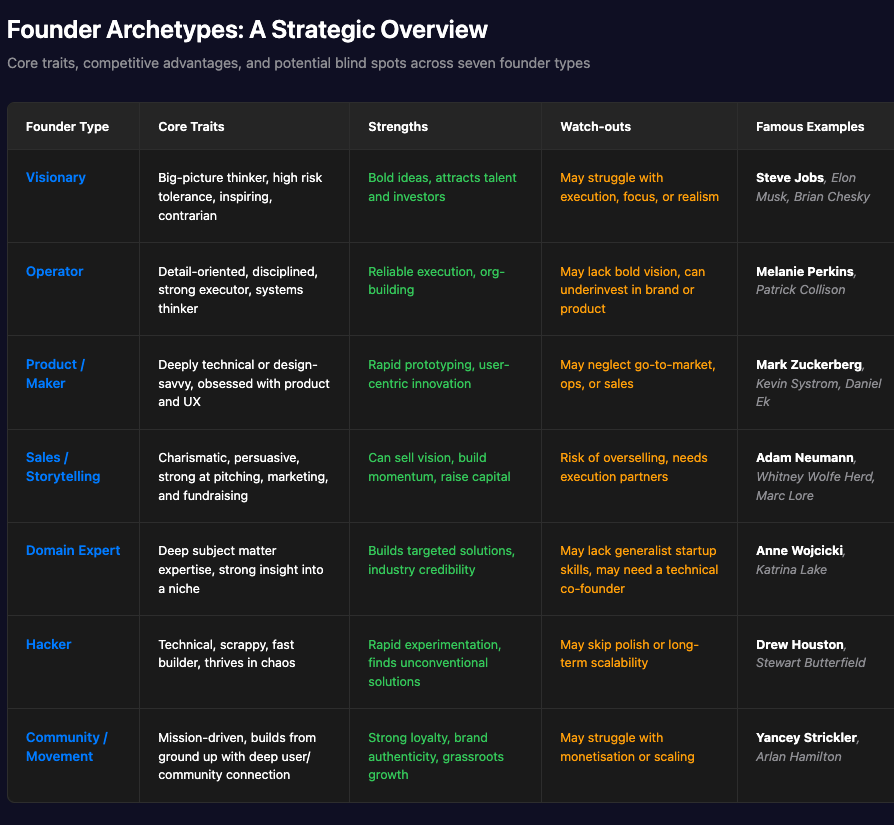
While archetypes are inherently limiting (venture capital, after all, is about spotting outliers before they're obvious), they're still a helpful lens for understanding founder-market-model alignment, and for reflecting on your own strengths, values, and context.
Here's what I discovered:
Different business models demand different people
The type of business you want to build determines the kind of person it needs to build it. For example:
If you want to build a hyper-scale technology startup, the dominant type that succeeds is a hybrid of the Visionary/Sales and Product builder. These people understand or can build the product but lead with strong vision and optimism about the future. They're great at pitching, which is crucial for raising capital, recruiting early teams, and driving initial traction. However, they might struggle to operationalise as the business scales.
On the other hand, execution-heavy ventures (like franchises or infrastructure plays) thrive under Operator types. These are people who are process-driven, detail-oriented, and consistent. They build strong companies based on fundamentals that are ready for scale, but they don't naturally gravitate to startup ideas that align with venture capital's high-growth demands.
Different markets reward different people
We often look at founder-market fit through the lens of whether the person suits the market. But we should also ask: does the market suit the person? Different industries reward different skill sets:
- Healthcare rewards operators and domain experts who bring trust and credibility.
- Deep tech favours highly technical people who can navigate complexity and build deeply technical products.
- Consumer and innovation-led sectors often reward visionary sellers who can successfully fundraise. People who can tell compelling stories are able to rally teams and attract capital, all of which is needed to get customers to move away from the status quo.
What I'm seeing more of is people becoming more deliberate about the kind of business model that suits their industry and reflects their values.
Market readiness beats ability
“When a great team meets a lousy market, market wins. When a lousy team meets a great market, market wins. When a great team meets a great market, something special happens.” — Andy Rachleff (Co-founder, Benchmark Capital)
Formidable people in a weak market are as good as weak people in a strong market. Turns out, the average person can be great too, as long as the market accepts their solution and its needs are met. Markets are not meritocratic. There are no rewards for process and presentation, only solutions.
Play to your strengths
These types aren't fixed. Great people evolve from builder to CEO, from sales to product leader. Especially in Africa's young, resource-constrained startup scene, people often wear multiple hats early on. But knowing your default operating mode helps understand where you can stretch yourself and where you realistically can't.
People who know their core strengths (builder, operator, visionary) can make smarter hires, find complementary co-partners, and grow more effectively. Assessing a startup's survivability often comes down to evaluating the founding team, not just the individual founder.
In a market where it can take up to three years to get a big client, we're all going to need the best teams and partners to improve our chances of success. We do that by understanding the kind of companies that are uniquely suited to what you enjoy doing and are good at.
"What are you? Whatever you are, that's how you find success. If you're a salesman, you sell your way to success. If you're a politician, you politic your way to success. If you're a fighter, you fight your way to success. You can't find success by being something you're not" — Alan Knott-Craig (Founder, Fibertime)
Success is the only metric that matters
In reality, strong people are only recognised in hindsight, after they've succeeded. If you browse LinkedIn bios of high-profile company builders, you'll see a wide variety of backgrounds: music majors, ex-corporates, serial entrepreneurs.
There is no formula, and that's the point. People are rewarded for solving problems and investors are rewarded not for the "obvious" bets, but for having a differentiated thesis about what kind of person wins in that particular market and opportunity.
Anyone can be a business builder. At the end of the day, success (carving out room for yourself in a market) is the only metric that matters that can truly determine if you're a 'strong' builder.
I'm wrapping up this share while grappling with a lot about what it means to build a business from scratch in real time while also navigating a few significant life changes. I'm struck by how much there is still to learn—about markets, about timing, about myself as a builder.
Keep in touch...
Thanks for reading! I hope some of the content I've shared in this capsule series resonated, and would love to connect if any of these thoughts sparked something for you. Reach me at sona@aria-africa.com.
Here's to sharing what's working, what isn't, and why, as we all figure this out together.
Cheers!
Sona
Editorial Note: A version of this article was first published by Business Report on 10 June 2025.


